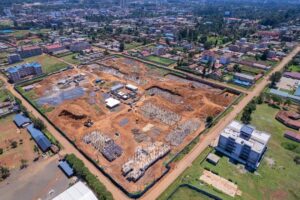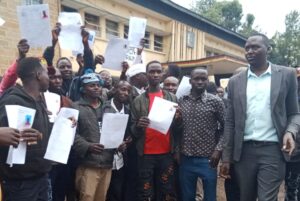Elgeyo Marakwet County distributes heifers in Sambirir to increase milk production

Elgeyo Marakwet County has distributed 120 heads of dairy cows to farmers in Upper Sambirir Ward in Marakwet East in a bid aimed at increasing milk production.
The farmers from three locations of Kipkaner, Koibatek, and Sambirir were identified in a public participation exercise in barazas.
Agriculture and Livestock CEC Edwin Seroney said the farmers were required to have fodder, water, and a shade in order to qualify for allocation of an heifer.
“We sent staff from livestock department and area chiefs to confirm that those selected had made the set conditions, ” he said during a distribution exercise at Chesoi centre.
The cows, a mixture of Ayrshire and fresian breeds, according to CEC Seroney, will earn the farmers upto Sh10 million in a year once all heifers calve.
He said: “If the 120 cows will produce an average of five litres, in a year, we will have about 220 litres which will earn the farmers more than Sh10 million when a litre of milk will be sold at Sh50. This will greatly impact the economy of the area positively.”
Seroney thanked the residents of Sambirir for setting aside more funds to the agriculture and livestock department, which, according to him, the sector
is not only productive but can also spur the economy of the county.
He further enlightened them on the wealth creation bill that is in draft stage that prompts each family to have a cash crop or dairy value chain in half an acre, as per governor Wisley Rotich’s Pesa Mfukoni program.
Grace Kirop, a beneficiary who could not hide her excitement, thanked Governor Wisley Rotich for keeping his promise.” Last month, he assured us that the heifers would be delivered.Here we are today. I am happy.”
Cooperatives CEC Robert Kangogo urged the beneficiaries to join Sambirir dairy farmers Cooperative society in order to enjoy benefits extended to farmers by the union.
Livestock CO Robert Lagat said cattle dips in the area will be renovated. “We will also revamp our artificial insemination services so that we get quality livestock,he said.His agriculture counterpart Edwin Komen advised the beneficiaries to observe good farming practices, which include proper feeding, pests, and disease control. “Farmers must also practice a closed system of management where compost manure goes to the farm to improve fodder production,” he added.
The cows were dewormed and vaccinated against foot and mouth disease before they were released to the farmers.





